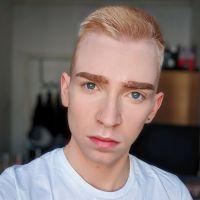Being non-binary and queer at university
Going to university helped Darren understand their identity and find their place within the LGBT+ community
Share
As someone who grew up in London, when I moved across the country to do my undergraduate degree in English and creative writing at Manchester Metropolitan University, I was apprehensive. The campus that I was going to be at was the Cheshire campus in Crewe (now sadly closing down) which was a completely different world to the one that I was used to.
Crewe is a small town in the North West of England. Although I was happy to be there and have a break from London, I thought that the area might not be as accepting of my camp, flamboyant self. But escaping London was important to me because I needed time and space to deal with my body dysmorphia and the turmoil in my mind in relation to my gender identity.
I am happy to say that my experience at university was great. Although the majority of my friends weren’t queer, they were very accepting and pushed me to try new things to make me feel comfortable. Over the three years there, I really discovered who I was and, in part, that was thanks to the university.
The creative writing side of my course really helped me to find my place. The lecturers were always excited to hear from the queer kids who often had a slightly different perspective in their writing.
However, there were times that lecturers unfortunately missed the mark. One time that really stands out was when a boy called James was transitioning and was asked by one of the lecturers if he would talk about his journey to the class because we were talking about gender that week.
Although we knew that the lecturer didn’t mean to be malicious or offensive, it made James feel uncomfortable. His transition, which he was still going through at the time, was private to him and not for everyone to be a part of.
Student life in London: culture and cuisine
The Manchester Met Cheshire societies mainly revolved around sports with a few arts societies thrown in. The LGBT+ society was called The People Project, which I never really understood. I didn’t like that it wasn’t explicitly called the LGBT+ society. When I asked them about the name they didn’t have an answer, but they also didn’t want to change it because they didn’t want to annoy the people who created the society. An LGBT+ society that didn’t want to change because of old traditions wasn’t a society I wanted to join, so I never did.
They did host one of the most popular nights of the year on campus though, which was called “CrewePauls Drag Race”. It was the university's version of RuPaul’s Drag Race. The event brought alumni back and packed out the student union for the night. It was great to see all the different people giving it a go, whether they were fans of the show, drag kings or queens, or straight guys having a laugh.
It wasn’t until my second year of university when I went to National Student Pride that I really understood what queer student life could actually be like. The first time I went I was quite overwhelmed and was the only one from my university there. But I ended up making friends with people from the University of Canterbury LGBT+ society and had an amazing time watching Alaska 5000 (an American drag performer) host a lip-sync competition and rooting for the Canterbury contestant. I went the next year as a journalist for Attitude magazine and the following year I started volunteering as a press officer for National Student Pride.
When I started my master’s in 2017 at Goldsmiths, University of London, I had a much better understanding of my gender identity and sexuality than when I started my undergraduate degree in 2014. One of the main things that Manchester Metropolitan helped me to do was really process my identity and be comfortable with it.
During my master’s, I met with lots of queer people. London is full of all kinds of people living very freely. One of my lecturers for my body image unit was a transgender woman and she spoke openly about her identity, how it helped her with her research and informs what she teaches now.
Although I didn’t get involved with the LGBT+ society at this university either, the university did do a lot for queer people: they celebrate LGBT+ history month with lots of talks and events, have an LGBT+ night and have lots of safe spaces for queer people.
Overall, my experience at university as a queer person has been really positive. From surrounding myself with open-minded people, joining in on LGBT+ events and engaging with the community to being taught by professional queer people, university life for me really shaped me into the queer person that I am today.
Read more: Being transgender at university
